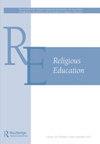Crossing Borders: Religious Education for Gender Equity in a Neoliberal Society
IF 0.4
3区 哲学
0 RELIGION
引用次数: 0
Abstract
AbstractGender conflict, which is emerging as a serious concern in Korean society, is also a subject of discourse in the field of education. A vast majority of university students are affected by economic downturn and are required to compete in an uncertain situation. This study proposes an educational model from the perspective of understanding the younger generation, which is struggling in uncertain situations, rather than treating gender conflict merely as hatred between individual women and men. This paper also proposes an educational environment wherein students feel encouraged to deal with gender conflicts by understanding their liminal spaces and crossing borders for gender equity.Keywords: Gender equityneoliberalismwomen’s movement in Koreagender conflictfeminism reboot Disclosure statementNo potential conflict of interest was reported by the authors.Notes1 While explaining the brief history of feminist theology, Rosemary Radford Ruether (Citation2002) describes many Hispanic and Asian women as cross-border theologians who are immigrants or visitors (10). Julie Browne (Citation2019) explains her experience as a medical educator and professor living in liminal spaces. She performs at least two professional roles, and she seeks to develop a mental attitude of living more comfortably in the in-between spaces (4–8). I define all theologians as inherently cross-border theologians, living in a liminal space. We all have an important theological task that constantly transgresses the boundary between the Realm of God and this world, between Christian tradition and human experiences, and between theology and human sciences. We, as educators living in liminal spaces, are also required to cross borders between teachers and students, between classroom and reality, and between knowledge and practice.2 The five phases of the Korean women's movement are those classified by the author, focusing on major events that occurred in the history of the women's movement and major changes in Korean society.3 By clarifying the relationship between identity and experience, Macdonald contends that experiences are causally related to their identities, but not in a deterministic way (Macdonald Citation2002, 122–127).Additional informationNotes on contributorsHyun-Sook KimHyun-Sook Kim is a professor of Christian Education at the United Graduate School of Theology at Yonsei University and Director of the Center for Gender Equity at Yonsei University, Seoul, Korea. E-mail: hyunskim@yonsei.ac.kr跨界:新自由主义社会性别平等的宗教教育
摘要性别冲突是韩国社会日益关注的问题,也是教育领域的一个话题。绝大多数大学生受到经济衰退的影响,需要在不确定的情况下竞争。本研究提出了一种从理解在不确定的情况下挣扎的年轻一代的角度来看待性别冲突的教育模式,而不是仅仅将性别冲突视为男女个体之间的仇恨。本文还提出了一个教育环境,鼓励学生通过理解他们的阈限空间和跨越性别平等的边界来处理性别冲突。关键词:性别平等;新自由主义;韩国妇女运动;性别冲突;注1在解释女性主义神学的简史时,Rosemary Radford Ruether (Citation2002)将许多西班牙和亚洲女性描述为移民或访客的跨界神学家(10)。Julie Browne (Citation2019)解释了她作为一名医学教育家和教授生活在有限空间中的经历。她至少扮演两个专业角色,她试图培养一种更舒适地生活在中间空间的心理态度(4-8)。我把所有的神学家都定义为天生的跨界神学家,生活在一个有限的空间里。我们都有一项重要的神学任务,它不断地跨越上帝的王国与这个世界、基督教传统与人类经验、神学与人文科学之间的界限。作为生活在阈限空间中的教育者,我们也需要跨越教师与学生、课堂与现实、知识与实践之间的边界韩国妇女运动的五个阶段是作者划分的阶段,重点是妇女运动历史上发生的重大事件和韩国社会的重大变化通过澄清身份和经验之间的关系,Macdonald认为经验与他们的身份有因果关系,但不是以一种决定性的方式(Macdonald Citation2002, 122-127)。金贤淑(shyun - sook Kim)是延世大学神学联合研究生院的基督教教育教授,也是韩国首尔延世大学性别平等中心的主任。电子邮件:hyunskim@yonsei.ac.kr
本文章由计算机程序翻译,如有差异,请以英文原文为准。
求助全文
约1分钟内获得全文
求助全文
来源期刊

RELIGIOUS EDUCATION
RELIGION-
CiteScore
0.90
自引率
28.60%
发文量
46
期刊介绍:
Religious Education, the journal of the Religious Education Association: An Association of Professors, Practitioners, and Researchers in Religious Education, offers an interfaith forum for exploring religious identity, formation, and education in faith communities, academic disciplines and institutions, and public life and the global community.
 求助内容:
求助内容: 应助结果提醒方式:
应助结果提醒方式:


